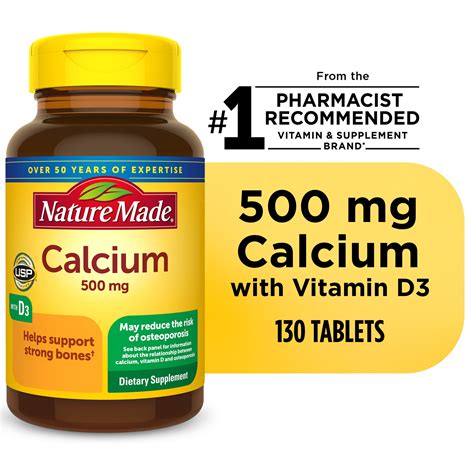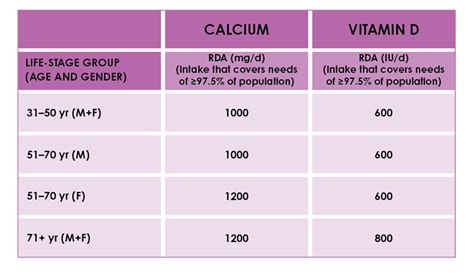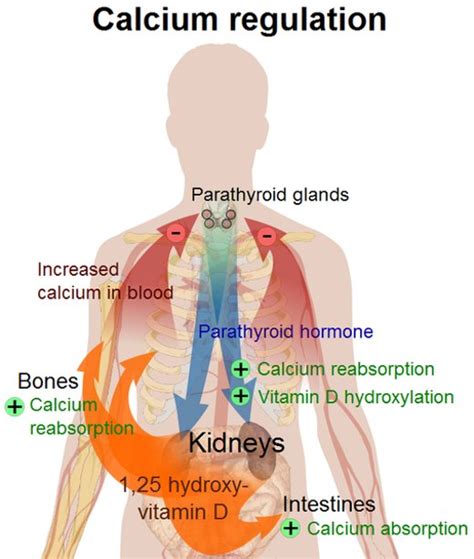Intro
Vitamins and minerals are essential nutrients that play a crucial role in maintaining our overall health and well-being. Among these nutrients, vitamin D and calcium are two of the most important ones, as they work together to build and maintain strong bones and teeth. Vitamin D, in particular, is a fat-soluble vitamin that helps our bodies absorb calcium, which is necessary for the normal mineralization of bone. In this article, we will delve into the importance of vitamin D and calcium, their benefits, working mechanisms, and steps to ensure adequate intake.
The importance of vitamin D and calcium cannot be overstated. Vitamin D deficiency has been linked to various health problems, including osteoporosis, diabetes, and certain types of cancer. Similarly, calcium deficiency can lead to weakened bones, osteoporosis, and an increased risk of fractures. Moreover, vitamin D and calcium work together to regulate various bodily functions, such as muscle function, nerve function, and heart health. Therefore, it is essential to ensure that we get enough vitamin D and calcium through our diet, supplements, or exposure to sunlight.
Vitamin D and calcium are also essential for maintaining strong immune systems. Vitamin D has been shown to have immunomodulatory effects, which means that it helps regulate the immune system and prevent autoimmune diseases. Calcium, on the other hand, is necessary for the proper functioning of immune cells, such as T-cells and B-cells. Additionally, vitamin D and calcium have anti-inflammatory properties, which can help reduce the risk of chronic diseases, such as heart disease and cancer. With the increasing prevalence of these diseases, it is more important than ever to ensure that we get enough vitamin D and calcium in our diets.
Vitamin D and Calcium: Benefits and Importance

Vitamin D and calcium have numerous benefits and importance. Some of the benefits of vitamin D include:
- Maintaining strong bones and teeth
- Regulating immune system function
- Reducing the risk of chronic diseases, such as heart disease and cancer
- Improving mood and cognitive function
- Supporting weight loss and management Calcium, on the other hand, has the following benefits:
- Building and maintaining strong bones and teeth
- Regulating muscle function and nerve function
- Supporting heart health and blood clotting
- Reducing the risk of osteoporosis and fractures
- Supporting weight loss and management
Working Mechanisms of Vitamin D and Calcium
Vitamin D and calcium work together to build and maintain strong bones and teeth. Vitamin D helps our bodies absorb calcium, which is then used to mineralize bone and teeth. This process is essential for maintaining strong bones and teeth, as well as preventing diseases such as osteoporosis and rickets. Additionally, vitamin D and calcium have anti-inflammatory properties, which can help reduce the risk of chronic diseases, such as heart disease and cancer.Steps to Ensure Adequate Intake of Vitamin D and Calcium

To ensure adequate intake of vitamin D and calcium, follow these steps:
- Eat a balanced diet that includes foods rich in vitamin D and calcium, such as fatty fish, dairy products, and leafy greens
- Take supplements if necessary, especially during winter months or if you have a limited diet
- Spend time outdoors to get exposure to sunlight, which helps our bodies produce vitamin D
- Avoid sugary drinks and foods that can interfere with calcium absorption
- Consider consulting with a healthcare professional or registered dietitian to determine your individual needs
Practical Examples and Statistical Data
According to the National Institutes of Health, approximately 40% of adults in the United States have a vitamin D deficiency. Additionally, a study published in the Journal of Bone and Mineral Research found that calcium supplementation can reduce the risk of fractures in older adults by up to 30%. These statistics highlight the importance of ensuring adequate intake of vitamin D and calcium.Vitamin D and Calcium Deficiency: Causes and Symptoms

Vitamin D and calcium deficiency can be caused by various factors, including:
- Limited diet or malabsorption
- Lack of exposure to sunlight
- Certain medical conditions, such as celiac disease or kidney disease
- Medications that interfere with vitamin D and calcium absorption Symptoms of vitamin D and calcium deficiency include:
- Weakened bones and teeth
- Fatigue and muscle weakness
- Mood changes and cognitive impairment
- Increased risk of fractures and osteoporosis
Treatment and Prevention of Vitamin D and Calcium Deficiency
Treatment and prevention of vitamin D and calcium deficiency involve ensuring adequate intake through diet, supplements, and exposure to sunlight. Additionally, addressing underlying medical conditions and medications that may be contributing to the deficiency is essential. In some cases, prescription medications may be necessary to treat vitamin D and calcium deficiency.Vitamin D and Calcium: Interactions with Other Nutrients

Vitamin D and calcium interact with other nutrients, such as:
- Magnesium: essential for vitamin D and calcium absorption
- Phosphorus: can interfere with calcium absorption
- Vitamin K: necessary for blood clotting and bone health
- Omega-3 fatty acids: may enhance vitamin D and calcium absorption
Conclusion and Future Directions
In conclusion, vitamin D and calcium are essential nutrients that play a crucial role in maintaining our overall health and well-being. Ensuring adequate intake of these nutrients is essential for preventing diseases such as osteoporosis and fractures. Future research should focus on developing new strategies for preventing and treating vitamin D and calcium deficiency, as well as exploring the interactions between these nutrients and other nutrients.What are the benefits of vitamin D and calcium?
+Vitamin D and calcium have numerous benefits, including maintaining strong bones and teeth, regulating immune system function, and reducing the risk of chronic diseases.
How can I ensure adequate intake of vitamin D and calcium?
+To ensure adequate intake of vitamin D and calcium, eat a balanced diet that includes foods rich in these nutrients, take supplements if necessary, and spend time outdoors to get exposure to sunlight.
What are the symptoms of vitamin D and calcium deficiency?
+Symptoms of vitamin D and calcium deficiency include weakened bones and teeth, fatigue and muscle weakness, mood changes and cognitive impairment, and increased risk of fractures and osteoporosis.
We hope this article has provided you with a comprehensive overview of the importance of vitamin D and calcium. If you have any questions or comments, please feel free to share them below. Additionally, if you found this article helpful, please consider sharing it with your friends and family to help spread awareness about the importance of these essential nutrients.
